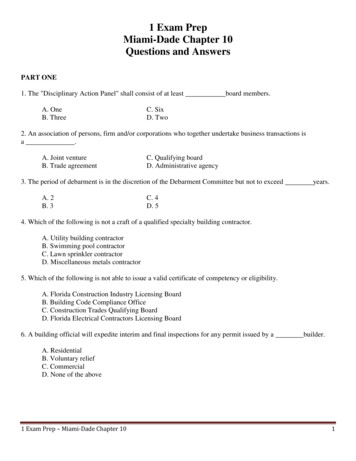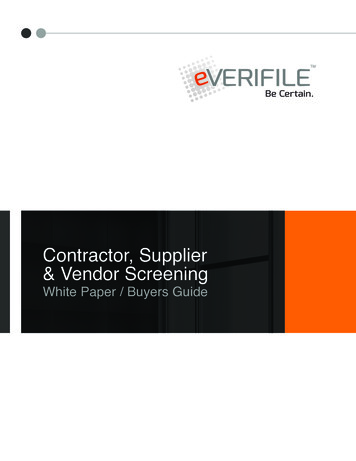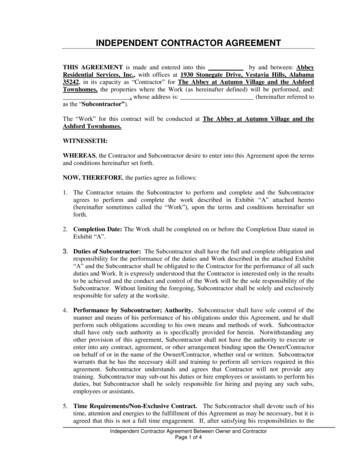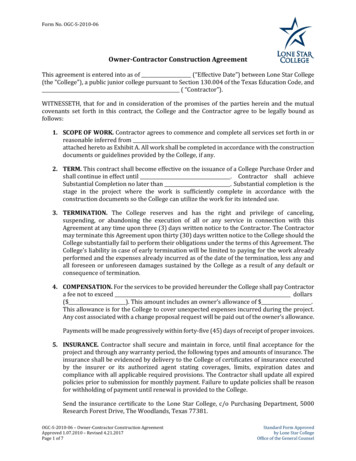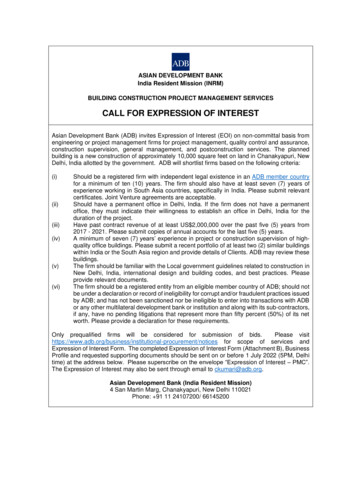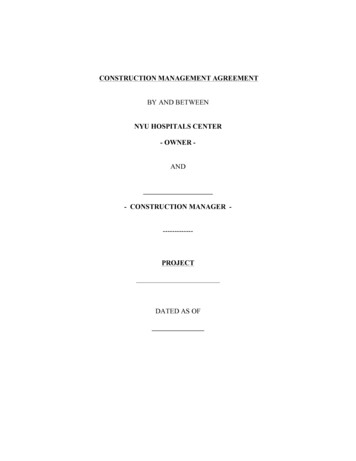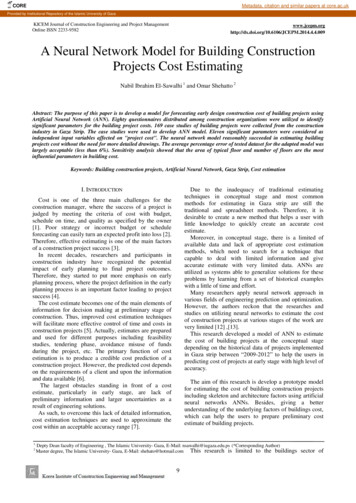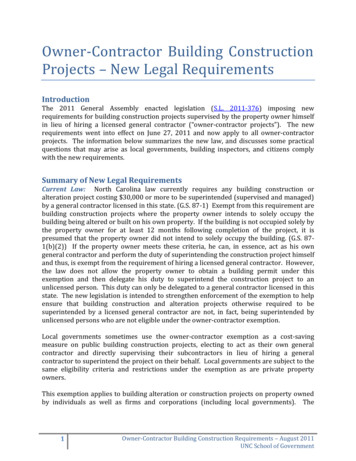
Transcription
Owner-Contractor Building ConstructionProjects – New Legal RequirementsIntroductionThe 2011 General Assembly enacted legislation (S.L. 2011-376) imposing newrequirements for building construction projects supervised by the property owner himselfin lieu of hiring a licensed general contractor (“owner-contractor projects”). The newrequirements went into effect on June 27, 2011 and now apply to all owner-contractorprojects. The information below summarizes the new law, and discusses some practicalquestions that may arise as local governments, building inspectors, and citizens complywith the new requirements.Summary of New Legal RequirementsCurrent Law: North Carolina law currently requires any building construction oralteration project costing 30,000 or more to be superintended (supervised and managed)by a general contractor licensed in this state. (G.S. 87-1) Exempt from this requirement arebuilding construction projects where the property owner intends to solely occupy thebuilding being altered or built on his own property. If the building is not occupied solely bythe property owner for at least 12 months following completion of the project, it ispresumed that the property owner did not intend to solely occupy the building. (G.S. 871(b)(2)) If the property owner meets these criteria, he can, in essence, act as his owngeneral contractor and perform the duty of superintending the construction project himselfand thus, is exempt from the requirement of hiring a licensed general contractor. However,the law does not allow the property owner to obtain a building permit under thisexemption and then delegate his duty to superintend the construction project to anunlicensed person. This duty can only be delegated to a general contractor licensed in thisstate. The new legislation is intended to strengthen enforcement of the exemption to helpensure that building construction and alteration projects otherwise required to besuperintended by a licensed general contractor are not, in fact, being superintended byunlicensed persons who are not eligible under the owner-contractor exemption.Local governments sometimes use the owner-contractor exemption as a cost-savingmeasure on public building construction projects, electing to act as their own generalcontractor and directly supervising their subcontractors in lieu of hiring a generalcontractor to superintend the project on their behalf. Local governments are subject to thesame eligibility criteria and restrictions under the exemption as are private propertyowners.This exemption applies to building alteration or construction projects on property ownedby individuals as well as firms and corporations (including local governments). The1Owner-Contractor Building Construction Requirements – August 2011UNC School of Government
exemption – and the criteria for eligibility under the exemption – applies to bothresidential and commercial building construction projects.New Requirements: S.L. 2011-376 (H 648) does not change the eligibility criteria underwhich a property owner qualifies for the owner-contractor exemption. Instead, thelegislation amends G.S. 87-14 to now require a property owner who wishes to act as hisown general contractor to submit an affidavit to the local building inspector verifying hiseligibility for the owner-contractor exemption. The person executing the affidavit mustattest to three facts:1. The person is the owner of the property on which the building is being constructedor altered, or, if the property is owned by a firm or corporation, the person is legallyauthorized to act on the firm or corporation’s behalf;2. The person will personally superintend and manage all aspects of the constructionor alteration of the building, and that he will not delegate this duty to any otherperson who is not a licensed general contractor; and3. The person will be personally present for all building inspections required underthe North Carolina State Building Code (this last requirement does not apply if theplans for the building were drawn and sealed by a licensed architect).The local building inspector is required to submit the affidavit to the North CarolinaLicensing Board for General Contractors for verification that the property owner is eligibleto act as his own general contractor under the exemption to G.S. 87-1. If the Boarddetermines that the property owner is not eligible for the exemption, the building permitissued for the construction project must be revoked. In addition, local building inspectorsare prohibited from conducting building inspections during construction if the propertyowner is not personally present during the inspection (this prohibition does not apply ifthe building plans were drawn and sealed by a licensed architect).Application to Local Government Building Projects: These requirements do apply tolocal governments that choose to act as their own general contractor on public buildingconstruction or alteration projects. However, the legislation does not specify whichemployee or official must submit the affidavit on behalf of the local government. Given theformal requirement of submitting a verified affidavit, the individual should be:1. Legally authorized to act on behalf of the unit of government (such as the manager,finance officer, or public works director);2. Capable of personally supervising the construction project (the individual does nothave to be a licensed general contractor, but should be someone with enoughknowledge and experience to properly supervise the construction project);3. Able to be personally present at all building inspections (unless the plans are drawnand sealed by a licensed architect); and4. Clearly authorized in writing to undertake these activities on behalf of the unit ofgovernment, including submitting the required affidavit.2Owner-Contractor Building Construction Requirements – August 2011UNC School of Government
Frequently Asked Questions1. What building construction projects are required to be superintended by a licensedgeneral contractor?Under North Carolina law (G.S. 87-1), the construction of any building, highway, publicutilities, grading or any improvement or structure where the cost of the construction is 30,000 or more must be superintended (supervised and managed) by a general contractorwho is licensed in this state. A licensed general contractor is also required for erecting aNorth Carolina labeled manufactured modular building meeting the North Carolina StateBuilding Code. Among the exemptions to this requirement are “owner-contractor” projectsdiscussed in Question 2.2. Who is eligible for the “owner-contractor” exemption?A property owner can act as his own general contractor and thus be exempt from therequirement to hire a licensed general contractor for building projects costing 30,000 ormore if the property owner (including the owner’s family) intends to solely occupy thebuilding being altered or built on his property. If the building is not solely occupied by theproperty owner for at least 12 months following completion of the project, it is presumedthat the property owner did not intend to solely occupy the building. (G.S. 87-1(b)(2))In addition, a property owner who acts as his own general contractor must personallysupervise and manage the building construction or alteration project for which the buildingpermit was obtained under the exemption. The property owner cannot then delegate thisduty to an unlicensed person to superintend the project on his behalf. After the buildingpermit has been obtained pursuant to the exemption, the property owner can only delegatethis duty to a general contractor licensed in this state.This exemption applies to building alteration or construction projects on property ownedby individuals as well as firms and corporations (including local governments). Theexemption – and the criteria for eligibility under the exemption – applies to bothresidential and commercial building construction projects.3. How does a property owner qualify for the exemption?If a property owner meets the eligibility requirements for the “owner-contractor”exemption (he owns the property on which the building is being altered or constructed andintends to solely occupy the building once completed), the property owner must submit averified affidavit to the local building inspector attesting to certain facts when the propertyowner applies for a building permit. The building inspector cannot issue a building permitunless the property owner submits the affidavit.4. What information must the affidavit contain?At a minimum, the affidavit must attest to the following three facts:1. The person is the owner of the property on which the building is being altered orconstructed, or if the property is owned by a firm or corporation, the person islegally authorized to act on the firm or corporation’s behalf;3Owner-Contractor Building Construction Requirements – August 2011UNC School of Government
2. The person will personally superintend and manage all aspects of the constructionof the building, and that he will not delegate this duty to any other person who is nota licensed general contractor; and3. The person will be personally present for all building inspections required underthe North Carolina State Building Code (this last requirement does not apply if theplans for the building were drawn and sealed by a licensed architect).5. Is the property owner required to submit any additional information or supportingdocumentation with the affidavit?The new law does not require that the property owner submit any additional informationor supporting documentation with his affidavit. However, a local building inspector mayask questions, require the property owner to fill out a questionnaire or form, or requestadditional information in determining whether the property owner appears to qualify forthe exemption prior to issuing the building permit.6. Who must sign the affidavit?The affidavit must be signed by the owner of the property on which the building is beingconstructed. An individual who is or will be occupying the structure but who does not havean ownership interest in the property cannot sign the affidavit. If the property is owned bya firm or corporation (including a unit of local government), the person submitting theaffidavit must be legally authorized to act on the entity’s behalf.7. If the property is owned by multiple individuals (not a firm or corporation), do allproperty owners have to sign the affidavit?The new law is not clear on this point. The language of G.S. 87-14(a)(1)a. does notspecifically require all individual property owners to sign the affidavit, so it is reasonable toassume that the affidavit may be signed by only one of the property owners. For example,if the property is jointly owned by a husband and wife, the affidavit does not have to besigned by both spouses and may be signed by either the husband or the wife. However, ifthe husband and the wife sign the affidavit, then they both must personally supervise thebuilding project and be personally present at all building inspections (unless the planswere drawn and sealed by a licensed architect).8. If the property is owned by a firm or corporation, do all partners in the firm orcorporation have to sign the affidavit?No. The new law is clear on this point, and only requires the affidavit to be executed by aperson who has legal authority to act on behalf of the firm or corporation (including a unitof local government). It would be wise for the person who is acting on behalf of the firm orcorporation to have this legal authority in writing.9. If the property is owned by an individual, can that individual authorize someone else tosign the affidavit on his behalf?No. G.S. 87-14(a)(1)a. specifically requires the person submitting the affidavit to attest thathe or she owns the property on which the building is being altered or constructed. Only inthe case of property owned by a firm or corporation (including a unit of local government)can an individual be authorized to act on the property owner’s behalf.4Owner-Contractor Building Construction Requirements – August 2011UNC School of Government
10. Is a form affidavit available?Yes. A form affidavit has been developed by the UNC School of Government and has beenapproved by the North Carolina Licensing Board for General Contractors. A copy of html.11. What does the building inspector do with the affidavit?The building inspector must transmit a copy of the affidavit to the North Carolina LicensingBoard for General Contractors for verification that the property owner is validly entitled toclaim the exemption under G.S. 87-1(b)(2).12. What kind of review does the Licensing Board conduct?The Licensing Board is required to review the affidavit to verify that the property ownerwas validly entitled to claim the exemption under G.S. 87‑1(b)(2).13. What is the time frame for the Licensing Board’s determination?The new law does not specify the time frame within which the Licensing Board mustrender a determination as to the property owner’s eligibility to claim the exemption underG.S. 87-1(b)(2).14. Must the building inspector wait for a determination from the Licensing Board beforeissuing the building permit?No. The new law does not require the building inspector to delay issuing the buildingpermit pending the Licensing Board’s review of the affidavit submitted by the propertyowner. In fact, if the affidavit appears valid when presented to the building inspector and,based on the information contained in the affidavit along with other information thebuilding inspector might request, the owner appears to be eligible for the exemption, thebuilding inspector does not have a valid legal basis to delay issuing the building permit if allother permit requirements have been met. A local building inspector may ask questions,require the property owner to fill out a questionnaire or form, or request additionalinformation in determining whether the property owner appears to qualify for theexemption prior to issuing the building permit.15. What happens if the Licensing Board determines that the owner is not eligible for theowner-contractor exemption?If the Board determines that the property owner is not eligible for the exemption under G.S.87-1(b)(2), the Board will notify the building inspector of its determination and thebuilding inspector is required to revoke the building permit pursuant to eitherG.S. 153A-362 (for counties) or G.S. 160A-422 (for cities).16. What does the property owner do if his building permit is revoked?If a building permit is revoked, all construction activity must cease. In addition, otherpermits obtained under state or local laws applicable to the project also may be revoked.The property owner then has three choices: (1) modify his circumstances to become5Owner-Contractor Building Construction Requirements – August 2011UNC School of Government
eligible for the exemption; (2) hire a licensed general contractor to superintend the project;or (3) abandon the project altogether. Any resumption of construction activity on theproject will require the issuance of a new building permit (and perhaps other permitsapplicable to the project).17. Does the property owner have to be present at all building inspections?Yes. One of the facts to which the property owner (or person legally authorized to act onbehalf of the firm or corporation owning the property) must attest in the affidavit is that heor she will be personally present at all building inspections required by the North CarolinaState Building Code. If the person who executed the affidavit is not personally present, thebuilding inspector is not allowed to conduct the inspection. This requirement does notapply if the plans for the building were drawn and sealed by a licensed architect.18. Can the property owner delegate the responsibility of supervising the building projectto someone else?No. One of the facts to which the property owner (or person legally authorized to act onbehalf of the firm or corporation owning the property) must attest in the affidavit is that heor she will personally superintend and manage all aspects of the alteration or constructionof the building and will not delegate this this duty to any other person who is not a generalcontractor licensed in this state. If the person who executed the affidavit becomesunwilling or unable to personally supervise the project once construction has started, he orshe can only delegate this responsibility to a general contractor licensed in this state.19. Are there any penalties for violating the new law?Yes. If the Licensing Board determines that the property owner was not eligible for theexemption under G.S. 87-1(b)(2), the building inspector must revoke the building permitpursuant to either G.S. 153A-362 (for counties) or G.S. 160A-422 (for cities). If the buildingconstruction does not cease or resumes without complying with applicable state laws, G.S.87-13.1 authorizes the Licensing Board to apply to Superior Court for a restraining orderand injunction to stop further construction activity, and the court may order the propertyowner to pay for the Board’s reasonable costs associated with investigating andprosecuting the violation. Continued construction activity by the property owner may alsoconstitute a violation of the requirements of G.S. 87-1, which is punishable as a Class 2misdemeanor. In addition, swearing falsely on the affidavit (perjury) is also a criminaloffense punishable as a Class F felony. (G.S. 14-209)20. If I have any questions or need more information, who can I contact?General questions about thenew law:UNC School of GovernmentNorma Houstonnhouston@sog.unc.eduRich Duckerducker@sog.unc.edu6General contractor licensure:Building code enforcement:North Carolina LicensingBoard for General Contractors(919) 571-4183N.C. Department of InsuranceOffice of State Fire MarshallEngineering Division(919) 661-5880Owner-Contractor Building Construction Requirements – August 2011UNC School of Government
Licensing Board for General Contractors for verification that the property owner is eligible to act as his own general contractor under the exemption to G.S. 87-1. If the Board determines that the property owner is not eligible for the exemption, the building permit issued for the construction project must be revoked. In addition, local .
